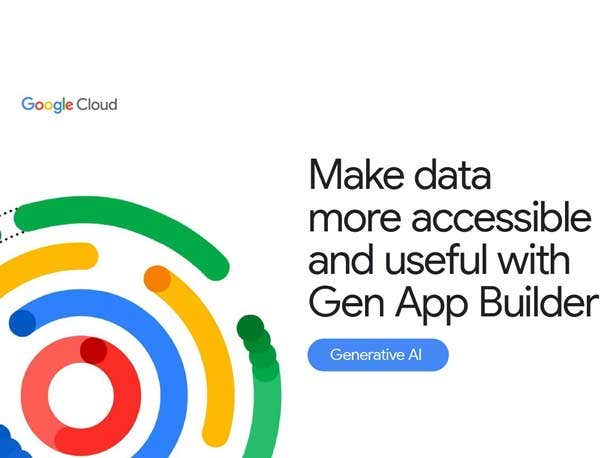Google Cloud Global VP On ‘Massive’ 2024 GenAI Incentives For Partners And Why AI Tech Bests AWS And Microsoft
Google Cloud’s partner ecosystem leader Kevin Ichhpurani explains new GenAI channel incentives ahead for partners in 2024, as well as why AI partners should pick Google over AWS and Microsoft.

Partners looking to drive AI margins and generative AI customer wins should place their bet on Google Cloud, with massive new channel incentives in store for 2024, says Google Cloud’s ecosystem leader.
“Partners are fundamentally seeing Google Cloud as the leader in AI,” Kevin Ichhpurani, Google Cloud’s corporate vice president and head of global ecosystem and business development, tells CRN. “We haven’t seen anything material from AWS candidly, but partners see us as having the DNA to win this battle in the industry.”
Ichhpurani is a key leader in Google Cloud’s AI channel strategy of enabling partners to win new GenAI customers and drive sales by enabling them to be an AI MSP, which specializes in providing lifecycle AI services for businesses of all sizes.
[Related: Google Cloud CEO: AI MSPs Are The Future]
The $33 billion Mountain View, Calif.-based cloud giant is enabling them through AI training, certifications, providing resources to ensure partners succeed on GenAI projects, as well as a new incentives in 2024 for partners driving GenAI customer adoption.
“On the GenAI side, we’re doubling our investments in programs for GenAI adoption. A 10X-increase for ISVs [independent software vendors] and SIs [system integrators],” Ichhpurani said.
In 2023, Google Cloud launched Vertex AI to allow businesses to interact, customize and embed foundation AI models inside their applications, along with its Model Garden where customers can access and fine tune foundation models. The company also injected its new collaborator Duet AI, which provides generative AI-powered assistance, into the Google Cloud Platform (GCP) and Google’s collaboration portfolio Workspace.
Ichhpurani said he’s “never seen an opportunity so large in my life for the ecosystem” than what GenAI brings to the table for channel partners. Customers are seeking partners to build and maintain their GenAI projects which are driving business transformations.
“They want somebody who is not just going to train an AI model, but they’re going to continue to refresh that model and update that model,” he said. “So this next generation of MSPs that our customers are asking for is like an AI MSP that maintains that model, trains the model, refreshes the model, and makes sure there’s not bias in the model. It’s not a onetime thing. It’s an ongoing thing.”
In an interview with CRN, Ichhpurani explains Google Cloud’s bold GenAI incentive and enablement plan for partners in 2024, as well as Google’s AI market differentiations compared to Amazon Web Services and Microsoft.

Why should partners who are more focused on AWS and Microsoft shift to Google Cloud heading into 2024?
Number one, partners are fundamentally seeing Google Cloud as the leader in AI. We haven’t seen anything material from AWS candidly, but they see us as having the DNA to win this battle in the industry.
Number two, we have a long heritage here in AI. We’ve always been an AI-first company. Not only do we bring all of these technologies, in terms of first party from Google, but we’re also open. You look at Vertex, it is the only platform where we have both our first-party offerings that we offer end to end, but also third-party models. And they both have equal footing. That’s really unique.
Not only do we provide the full stack for customers that are looking for it, but if they want to use other major technologies in the market, we’re offering those on our platform as well with equal footing.
So the breadth combined with the openness is a real big differentiator. Customers are also not just looking for AI, they’re looking for the data foundation as well. We’re the only company that brings those both those two together integrated.

Any other reasons why partners should pick Google Cloud versus AWS or Microsoft?
One other thing that’s really important is that, we are targeting enterprise use cases and the requirements of enterprises, which are very distinct from the consumer use cases.
The consumers are looking for, ‘How do I create a trip itinerary? How do I create a recipe for this cake?’ With the enterprise they’re looking at, ‘How do I rethink a core business process?’ They care about data privacy. They care about responsible AI. They care about how to build a solution where they can minimize hallucination, because they cannot afford to have wrong output.
These are the problems that we’re solving for clients with our controls and our solutions that are very unique for enterprise use cases.
And lastly, we are not scaling a large services organization.
Our services business is largely focused on augmenting partners, with a very small portion of the engagement to make sure that deep technical expertise is there to support a customer go-live. We are partner-first in our approach, which I think is very differentiated relative to our other players in the market.
It represents a huge opportunity because we don’t have that same level of [channel conflict] challenges that other companies have, because we’re very clear on our partner-first agenda. So partners can engage with our customers. We want them to take the lion’s share of the services engagement.

What is Google Cloud doing around GenAI incentives in 2024 to drive adoption and channel margins?
We’re really excited about 2024 because we’ve got a lot of exciting new programs that we plan to launch. We’re significantly increasing the investments around our partner incentives.
For example, if you look at our services partner, we have a number of services-based partner incentives—these would be things like incentives to do POCs and for our services partners to do assessments for clients. This could be things like consumption acceleration funding—helping us ramp customers faster.
We plan to double our investments in that area, which is very significant.
If you look at GenAI adoption with clients, for partners who are deploying GenAI to customers, we plan to increase our investments 10x. So we’re really getting behind this.
I’m super excited because 2024 is probably going to be one of the biggest opportunities for partners ever given the transformation that’s happening with our customers and given the new incentives and tools that we’re delivering for the ecosystem. … Regarding incentives, we really want to rapidly accelerate the services-based ecosystem to drive this digital transformation with the customer.

Can you talk more about doubling partner investments in 2024 to drive greater margins around GenAI?
On the GenAI side, we’re doubling our investments in programs for GenAI adoption. A 10X-increase for ISVs and SIs.
More broadly outside of GenAI, across all areas, we have a number of new funding mechanisms that will be available for partners—everything from funding around sourcing of new logos and assessments. If you look at partners doing assessments, we have a co-funding mechanism there. Also, a funding mechanism for doing POCs. This is all part of our RAMP program.
We also have funding if a partner is helping us find a new workload or helping us ramp faster with the client. We have funding around that what we call consumption acceleration funding.
So across these different areas, we are doubling our investments. Because we just see so much demand. Customers are saying, ‘We need deep services acumen to help us deploy in these use cases.’ They can’t do it on their own. So in order to really foster that ecosystem, we’re putting material investments forward.

What is Google Cloud doing to enable partners now and in 2024?
A big area of focus for us is customers are saying, ‘I need help in these areas [of security, GenAI and my data foundation]. My expectation of quality is a lot higher than it was in the past.’
We’ve done a lot of new programs on delivery quality to help our partner community, starting with our Delivery Readiness Index, where we’ll look at the actual delivery team that shows up at the customer site and give a validation that—not only do they have the certifications and the specializations—but the people have been there, done that before. And that’s really helped our services partners credential them in front of the client.
We’ve taken our tooling, our best practices, our methodologies, our run books—all wrapped up as part of delivery navigator—and we’ve externalized it. So partners can use all the things we use internally.
We’ve created service offerings to augment our partners from our own PSO (partner support services) in order to ensure that customers have a successful go live. … We want to augment them on deep technical skills that are critical to ensure the successful customer go-lives. Essentially, we’re safeguarding the engagement with our Partner Assurance Services. So these a couple of the things that we’re really doing around delivery quality.

What is your advice for Google Cloud partners who want to be the most successful in 2024?
Fundamentally, the partners that are going to be the most successful are the partners that are going to be the ones that have deep services capability. That is fundamentally what every customer is asking for.
They’re coming to us and saying, ‘Bring me the partners that have the deep services capability.’ They’re almost stack ranking the partners that they work with based on the ones that have the deepest services competency.
We’re gearing our incentives towards services-based outcomes for clients, and digital transformation with our customers. That’s the real theme. You’re going see a lot more services-based incentives. We’re significantly expanding incentives for partners that are bringing new logos for GenAI adoption.
What’s at the heart of Google Cloud’s partner strategy for GenAI?
Services-based business transformation is at the heart of it. Companies are fundamentally trying to digitally transform themselves. In the past, companies were just moving workloads to the cloud. They were running on-prem servers, now they’re running on the cloud. There was an ROI on that and cost savings.
But now, companies are trying to rethink their entire business using generation AI. That’s a huge opportunity for the ecosystem. I’ve never seen an opportunity so large in my life for the ecosystem.